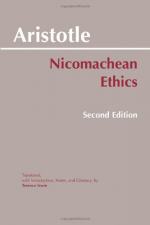
|
| Name: _________________________ | Period: ___________________ |
This test consists of 15 multiple choice questions and 5 short answer questions.
Multiple Choice Questions
1. By their intelligent deliberations, concerning what are those who have practical judgment distinguished from others, according to Aristotle's philosophical inquiry?
(a) Living well.
(b) Acquiring power.
(c) Making money.
(d) Avoiding problems.
2. With what sort of artists does Aristotle draw a comparison concerning the incontinent?
(a) Actors.
(b) Singers.
(c) Painters.
(d) Sculptors.
3. Of what two elements does Aristotle determine that wisdom is composed?
(a) Practical judgment and knowledge.
(b) Knowledge and intellect.
(c) Intellect and practical judgment.
(d) Art and intellect.
4. With what is the second part of the reasoning part of the soul concerned in the view of Aristotle?
(a) Things that cannot be other than they are.
(b) Things that can be other than they are.
(c) Things that might be but are not at all.
(d) Things that can never be.
5. In what status of life is having good friends considered beautiful by Aristotle in IX.11?
(a) Diurnal proceedings.
(b) Bad fortune.
(c) Good fortune.
(d) Unusual circumstances.
6. What does Aristotle state is akin to friendship in the beginning of IX.5?
(a) Goodwill.
(b) Familial relationships.
(c) Sound reason.
(d) Love.
7. In what city alone does Aristotle say that the lawgiver has taken care for upbringing and virtuous exercises?
(a) Athens.
(b) Sparta.
(c) Delphi.
(d) Crete.
8. With which of the following conditions does Aristotle compare the incontinent person in VII.10?
(a) Insanity.
(b) Drunkenness.
(c) Animality.
(d) Bloodlust.
9. In VIII.12, Aristotle states that every sort of friendship is in what?
(a) A family.
(b) A marriage.
(c) A government.
(d) A community.
10. When will virtuous upbringing and exercises no longer be painful in the theory of Aristotle?
(a) When the world ends.
(b) When they are habitual.
(c) When they are enforced by law.
(d) When there is a just ruler.
11. With what is IX.3 concerned?
(a) The corruption of friendships.
(b) The accepting of goods from friends.
(c) The eternity of friendships.
(d) The distribution of goods to friends.
12. In the loving of what does Aristotle state there is no reciprocity, in VIII.2?
(a) Inanimate things.
(b) Children.
(c) Animals.
(d) Spouses.
13. Aristotle compares the relationship between spiritedness and reason to the relationship between what?
(a) A sick patient and a doctor.
(b) A fiesty horse and a poor rider.
(c) A hasty servant and his master.
(d) Stone and a house-builder.
14. How many kinds of things does Aristotle say there are that must be avoided, having to do with one's character?
(a) Five.
(b) Three.
(c) A thousand.
(d) Twelve.
15. What sort of people does Aristotle state seldom turn up in positions of power?
(a) The incontinent.
(b) The virtuous.
(c) The friendless.
(d) The vicious.
Short Answer Questions
1. Aristotle notes that each political constitution involves friendship to the same degree that it involves what?
2. By what is the mean determined, according to Aristotle's analysis in the beginning of Book VI?
3. What fact does Aristotle point to in support of the hypothesis that living itself is a good?
4. In exchange for what is it perhaps enough, according to IX.1, to give what one can in return?
5. What principally occupies the topic of discussion in X.6?
|
This section contains 508 words (approx. 2 pages at 300 words per page) |

|




